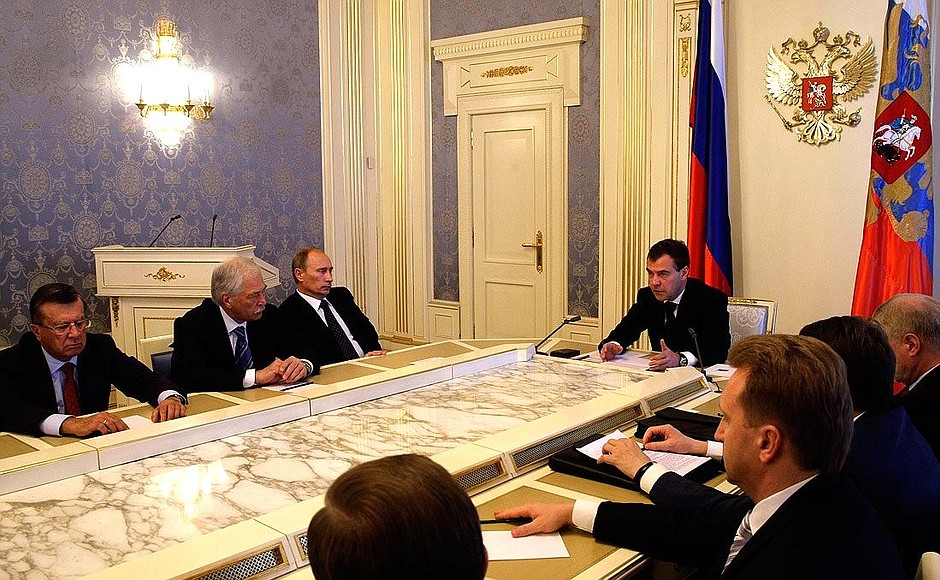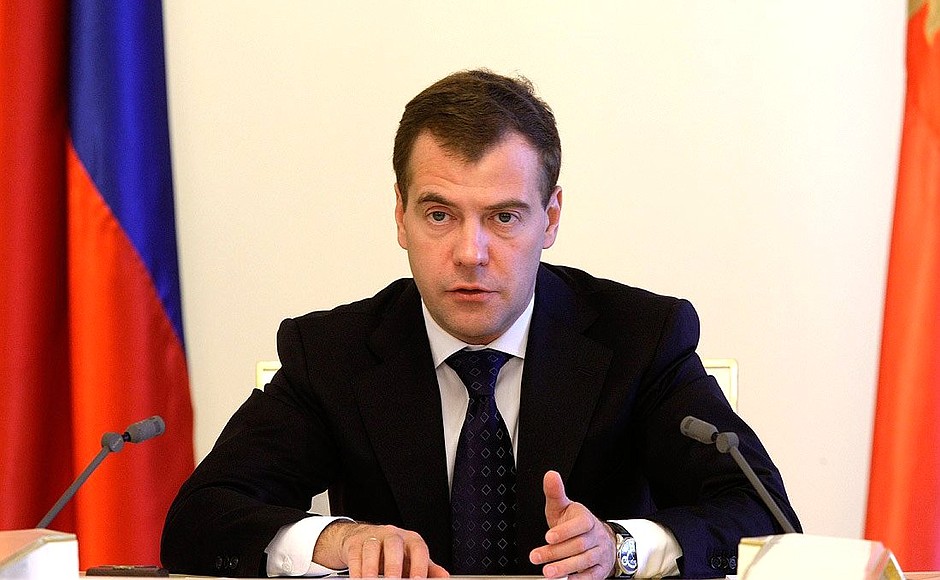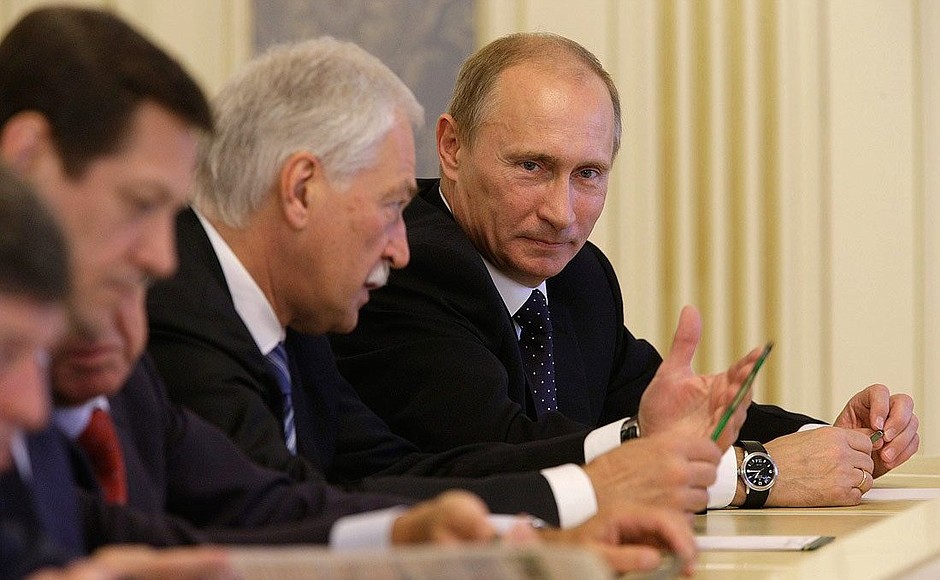First of all, it is essential to ensure macroeconomic stability and to lower inflation, proceeding from the need to decrease federal budget deficit by 2013 by no less than 50% compared to 2009, the President said.
It is also vital that budget policy corresponds to the nation's strategic development priorities and its fiscal potential. Dmitry Medvedev also noted it was time to begin to discontinue anti-crisis measures and devote the main part of the budget to financing long-term government programmes from 2012 onwards.
The Russian leader also stressed the importance of budgetary support to major investments in innovations, sharing risks with private investors and entrepreneurs. This approach should be employed in the establishment of the Skolkovo Innovation Centre. Other priorities in this area mentioned by Dmitry Medvedev include making broadband internet available to 90% of the population, and digital television to all Russians.
Innovation support, the President emphasised, must go hand in hand with investment in quality education at all levels.
Dmitry Medvedev underlined the importance of fulfilling the Government's commitments to pay out pensions and social benefits and informed the meeting participants that a pay indexation for public sector employees and the Armed Forces will take place next year. The President also touched on social security, healthcare, demographic policy and tax policy issues.
The objective of defence spending must be to create a new type of the Armed Forces. In 2011, the implementation of the new State Arms Programme for the period up to 2020 will begin, and the Federal Targeted Programme on Reforming the Defence Industry is being drafted at present. At the same time, the share of allocations for innovative research and projects will grow.
Dmitry Medvedev issued instructions to the Government to submit proposals on reducing the share of state property and to cut the number of state employees by about 20%.
Taking part in the meeting were members of the Government, including Prime Minister Vladimir Putin, Speakers of both houses of Parliament Sergei Mironov and Boris Gryzlov, and Chief of Staff of the Presidential Executive Office Sergei Naryshkin.
* * *
President of Russia Dmitry Medvedev: Colleagues, I have just signed the Budget Address on budget policy for 2011–2013. It contains the main principles for planning and implementing budget policy based on our priorities for future development. So, today I will say a few words about the Address, just as we have been doing it recently.
First of all, the economic situation in our nation has changed markedly in the last year. The economy is showing certain trends that are clearly positive, a number of sectors are demonstrating signs of growth, and the financial system is functioning trouble-free. To a large extent, this is the result of the anti-crisis measures taken by the government, which were aimed at maintaining macroeconomic stability, supporting the sectors that were hardest-hit by the crisis, and ensuring social support. What’s especially important is that we were able to maintain social stability, mitigate the social impacts of the [economic] crisis, and ensure – even in this difficult economic setting – a real increase in the level of support provided to our most vulnerable citizens, including pensioners. Implementing active measures on the job market has allowed us to stabilize unemployment.
But the crisis has shed light on our key problem: our nation’s economy remains overly dependent on the raw materials market situation. We have yet to create the necessary conditions and incentives for the large-scale implementation of modern technologies, increasing energy and environmental security, economic efficiency, and labour capacity, for the production of high-tech products and implementation of innovative projects. There is a danger that getting used to improvements in the [economic] situation, though the are still brief, during periods of high oil prices, could lead, just like in the past, to unwarranted complacency. This could mean that the chance to renew and modernise our economy may be passed over. This cannot be allowed, and our budget policy, being a part of our economic policy, must aim to bring comprehensive modernisation to our economy, create the necessary conditions for improving its efficacy, competitiveness, and ensuring its long-term stable development, as well as improving the investment climate. Based on what I just said, it is imperative to resolve the following problems.
First, we must ensure macroeconomic stability, following the policy directed toward reducing inflation. I suggest that we always remember the importance of gradually reducing the federal budget deficit by 2013 no less than two-fold, as compared to the 2009 level. That is precisely the goal that all G20 nations, all developed economies, are setting for themselves. And for us, it is not simply an acceptable reference point; it is an absolute need. Without sufficiently reducing the deficit, we risk losing the stability in our budgetary system that we worked so hard to achieve. That is precisely why we not only agreed with this figure, we also insisted on the need to validate these indicators within the framework of our work at the G20.
This is even more urgent for some of our partners whose budget gaps are twice that of Russia’s. If they do not resolve this problem, then the overall global economy will be unstable, and clearly, this is a very serious risk for us. This is therefore a universal challenge, common for all nations, and it needs to be addressed very diligently and consistently.
Second, it is imperative to bring our budget policy into strict accordance with the strategic priorities we have ourselves identified for our nation’s development and our state’s actual financial capabilities. They must be assessed based on long-term economic development forecasts, taking into account the experience we have acquired during the crisis years.
Today, we clearly cannot allow ourselves to be overly optimistic, but would also be mistaken to plan all our actions based on the worst-case scenario; if we do, then that is precisely the scenario that we will find ourselves in. Our assessments must be reasonable and based on the most probable trends in the global and Russian economies.
Third, the work of the entire budgetary system must be directed toward achieving concrete results. All new decisions must be made while taking into account the resources available to finance them, as well as their input into achieving our nation’s strategic development goals. We must begin work on gradually phasing out the anti-crisis measures we were forced to take. Government support on previously soft, favourable terms cannot be provided for long. From 2012, a large part of the federal budget must be presented as a set of long-term government programmes.
Fourth, we must develop and implement budgetary instruments for supporting large-scale investments as quickly as possible. Naturally, the success of this work depends not only on the availability of budgetary instruments, but on macroeconomic stability, on the level of competition, property rights protection, and level of administrative barriers as well. But we cannot do without financial incentives for innovation. This is very clearly seen in other nations, which have achieved significant success in this area.
The most effective method of support is to share risks with private investors and entrepreneurs. This approach must be reflected in the creation of Skolkovo innovation centre. It is imperative to ensure as soon as possible the creation of a special legal regime, the realisation of scientific, entrepreneurial, and other activities, and to make the implementation of innovative solutions by Skolkovo participants as easy as possible. All this needs to be done as soon as possible. We must set aside sufficient financial resources in order to build infrastructure and support current activities. Projects that are sponsored by the Commission for Modernisation must be given priority in terms of receiving financing. At the same time, the Government should formulate procedures to provide qualified professional expertise and oversight over the implementation of these projects, so that the resources are used as efficiently as possible.
We have many priorities, but I will emphasise only one: the project to provide no fewer than 90 percent of Russian citizens with access to broadband Internet and digital television services – naturally, we would want to provide digital television to even more of our population, all 100 percent. These technologies are capable of changing the quality and nature of our lives; so naturally, we are obligated to ensure that all of these goals are implemented to the fullest extent.
Fifth, support for innovations should not be limited to carrying out individual projects. We will not be able to modernise without having highly qualified workers, talented scientists who can work on these issues. Fortunately, we have seen a gradual renewal of interest in research and engineering professions. We must strengthen this trend and use our budget support instruments for this purpose. On the federal level, this should include shifting the focus in financing education and science towards support of work in priority areas.
Just as we've been doing in recent years, we need to continue investing money in high-quality education at all levels, ranging from implementing the Our New School initiative to developing national research and federal universities, as well as reforming the network of specialised vocational schools. It is also clear that businesses must be involved in these projects. Their involvement is not even a matter of philanthropy; rather, it is in the true interest of businesses to train high-quality professionals.
In addition to supporting the development of our own scientific schools, we should implement instruments to attract highly qualified foreign specialists to work in Russia’s science and education system, as well as implement large-scales programmes to educate and provide advanced training to Russian specialists at the best educational centres abroad.
Sixth, the government must unconditionally fulfil all of its obligations as regards payment of pensions, social security, and other compensations. We must improve significantly the efficacy of our social safety net and support of families. And we need to help those who need it most: people with disabilities, large families, pensioners, veterans, those who protect us, ensure our safety, and people who have found themselves in difficult life situations because of the current state of the economy.
We must be measured in our approach to increasing labour compensation fund. First and foremost, this concerns civil servants. We can wait a little before increasing our expenditures in this area; moreover, I feel it would be right for the Cabinet to submit suggestions on reducing the number of civil servants by twenty percent. Some of the money saved as a result should go toward rewarding individuals who achieve the best results in their work.
As for the public sector and the army, salaries and allowances must be indexed next year. I believe it is possible to increase from April 1, 2011, allowances payable to servicemen and equated persons, and from June 1, 2011, to increase labour compensation funds of federal government agencies and subsidies to federal autonomous agencies as necessary to an appropriate level, along with compensations to judges and public prosecution officers. From September 1 next year, we will increase our scholarship fund.
Seventh, we need to complete the development and begin the implementation of programmes aimed at improving the health of our citizens and promoting healthy lifestyles. We need to do everything possible to secure the positive demographic trends we have seen over the last several years. We have a whole range of priority areas here, and we are working on them, but one of the most important and difficult tasks is the development of nuclear medicine. The potential of this sector should be fully realised.
We are taking on commitments to participate in international initiatives to reduce maternal and infant mortality. Indeed, this is a very important priority in our own nation. We have had progress, but our results still lag behind those of the leading nations. It’s not as bad as it was before, not that dramatic, but we are behind nevertheless. We need to use the latest, most advanced technologies, including in the telemedicine sector, and other technologies to get results as soon as possible.
Eighth, our national defence expenditures must be sufficient enough to enable us to complete within the established deadlines the task of giving our Armed Forces new features. Next year, we will begin implementing a new government-sponsored arms programme for the next decade. Clearly, it needs to be fully financed and must resolve the problem of comprehensive re-equipment of the Armed Forces with the newest weapons and military technologies, as we discussed and agreed upon yesterday. We must also complete the development of the Federal Target Programme to reform our defence industry, in order to resolve this same challenge. The share of spending on cutting-edge research and solutions under these programmes must increase significantly against the previous years’ levels. We need to finance new products.
Ninth, we must carefully approach any changes to the overall tax burden on businesses and on people, our citizens. At the same time, we must support those who develop new technologies and implement innovative solutions. We must increase resources in the budget system, first and foremost, through better tax administration and a slight increase in taxation of individual goods, such as tobacco and alcohol. I also feel that this is the right time to work on reducing the share of state-owned property, also in order to raise the necessary financial resources. I will instruct the Government to promptly submit corresponding suggestions.
And finally, if we are going to work on modernising our economy, we will never achieve our overall goals if we modernise only certain areas or parts of it. This challenge concerns everyone, and it is a challenge geared toward the future, because every individual – let me repeat, everyone – must strive for specific results in their work, regardless of what they do, whether we are talking about maintenance or building roads, culture-related work or law enforcement, or any other function of the government. That is the only way that we will be successful.
Thank you.


